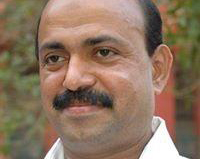Mangaluru, Oct 26: The protest against bad condition of Suratkal-Kana-MRPL road turned into anti-Mohiuddin Bava agitation after the Mangaluru North MLA refused to pay heed to the agony of the frustrated residents in his home constituency on Wednesday.
 The activists of Nagarika Horata Samiti, Kana who were staging a protest at Kana junction demanding the immediate repair of the 4.5-km stretch started raising slogans against Mr Bava after he passed through the same junction.
The activists of Nagarika Horata Samiti, Kana who were staging a protest at Kana junction demanding the immediate repair of the 4.5-km stretch started raising slogans against Mr Bava after he passed through the same junction.
A few days ago when a group of activists belonging to Social Democratic Party of India staged a protest for the same cause, Mr Bava had visited them and listened to their woes.
“We had expected that today he will visit us and endorse the cause of protesters. Astonishingly, he passed through the same road, but refused to stop his car. Instead he sped away,” said Mohammed Ajmal, a local resident.
The protesters did not block Mr Bava's car thinking he would stop. However, he exhibited arrogance. His driver increased the speed of his car all of a sudden, complained Carol Pinto, another local resident.
She also accused Mr Bava of trying to make the bandh a failure by using police. “But, it was a successful bandh. When more number of people joined the protest, police also realised the seriousness of the issue,” she added.
According to sources, Mr Bava went to Mangaluru International Airport, from where he flew to Saudi Arabia. He is supposed to take part in a cultural event of Indian expatriates in Riyadh, the capital of Saudi Arabia on Thursday night.
Also Read:
Local residents bring Suratkal-Kana-MRPL road to a standstill
MLA Bava accuses Samiti of blocking Suratkal-Kana-MRPL road repair work




Comments
@ Saboor,
Of course ppl will not forget if he did any good work at all..and ppl will not forget if he did'nt listen to them..so its vice-versa. He may have done good work in other places but if you are really from kana pls let me know one good
Dear Ansari,
What you think about Moidin, and What leasson will teach in 2018 election. people will not forget what good work he did for his constitution. He did lots of job for public in Surathkal - Kana area.
So keep quiet in political field you don't know politics.
Dear All,
Mr. Bawa came not for enjoying purpose. He came to Riyadh to participate in Beary Sangama Programme. After return to Mangalore he will finish the work pending in Surathkkal. So no one should worry about that.
He is a gentleman. Not like Palemar...
Ms. Vidya, why Palemar was watching blue films in assembly if he is good....he should have utilized his time in assembly for the progress of people of our constituency....they are all disaster....and same....
welcome to Riyadh ;)
People of this constitute will teach good lesson at 2018 election.
We appreciate Coastal Digest for bringing all political leaders issue without any partiality or any group wise like other chaddi paper of rss member.
Keep it up Coastal Digest
Jai Hind
Hahaha. I wholeheartedly congratulate Coastaldigest.com team for bringing this issue to light. Keep it up. expose more bearys and stop peeping into RSS chaddi.
# Vidya, If Palemar was better how he lost last election? Surathkal people will decide what to do and what not to do. Take care yourself at Dubai instead of nose in to non related matters by sitting in Dubai.
He is good for photo ops!!
Do we really need this kind of politicians? Palemar was million times better than him. Hope people of his constituency will teach him a good lesson in 2018.
Add new comment